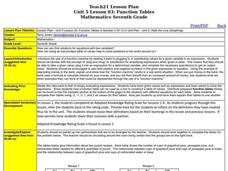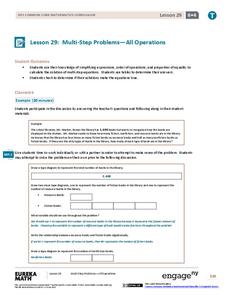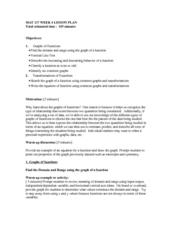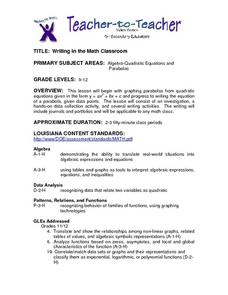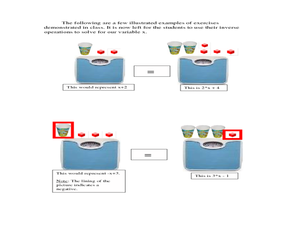EngageNY
Graphing Systems of Equations
Expand on learners' understanding of quadratic-linear systems. Building on the graphic understanding developed in the previous lesson, pupils learn algebraic methods of solving the systems.
Willow Tree
Weighted Averages
Mixtures, weighted percentages, and varying speeds make problem solving difficult. The resource give learners a strategy for tackling these types of problems effectively.
Curated OER
What's in a Name?
Students explore the plants that grow in Glacier National Park. In this plant biology lesson, students invite a guest speaker to speak about plants that grow in Glacier National Park, as well as the scientific names for the plants....
Virginia Department of Education
The Rate of a Chemical Reaction
If your pupils think a catalyst is a list of their cats, then this might be the lesson for you! Young chemists study the effect of temperature, catalysts, concentration, and particle size on reaction rates during four different...
Curated OER
Function Tables
Students identify function using tables of data. In this algebra lesson, students create a tale of point and plot on a coordinate plane. They analyze the graph as being a function or not.
Curated OER
Pigs, Goats and Sheep
Student are able to devise and use problem solving strategies to explore problems systematically and mathematically. They also form and solve various types of equations. This lesson plan requires some prior knowledge of equations.
Curated OER
Diophantus II
Students use an ancient math game to establish the context for solving problems by investigating them in a systematic and mathematical way. They also need to have the ability to solve various types of equations.
Curated OER
Middle Grades Math: Balancing Equations
Learners solve linear equations. By observing the graph of each side of an equation using the TI-nspire graphing calculator, your class gains insight into solutions, as well as balancing equations and transforming linear equations....
EngageNY
Geometric Sequences and Exponential Growth and Decay
Connect geometric sequences to exponential functions. The 26th installment of a 35-part module has scholars model situations using geometric sequences. Writing recursive and explicit formulas allow scholars to solve problems in context.
Virginia Department of Education
Molecular Model Building
During this hands-on activity, young chemists build molecular models based on the Lewis dot structure before studying valence shell electron pair repulsion theory.
EngageNY
Graphing the Tangent Function
Help learners discover the unique characteristics of the tangent function. Working in teams, pupils create tables of values for different intervals of the tangent function. Through teamwork, they discover the periodicity, frequency, and...
Virginia Department of Education
Predicting Products and Writing Equations
A chemistry lesson presents 14 chemical reactions for scholars to observe, write the equation, and balance the equations. Additionally, it provides ways to extend the activity as it relates to catalysts.
EngageNY
Multi-Step Problems—All Operations
Harness the power of algebra to solve problems. Young mathematicians learn to work out multi-step problems by applying algebraic techniques, such as solving equations and proportions. They use tape diagrams to model the problem to finish...
Curated OER
Linear Equations Game
Students participate in a mathematics game in order to investigate the concept of linear equations. They practice using rotations of the game to solve the equations. The teacher can intervene as necessary.
Curated OER
Graphs and Transformations of Functions
Is it possible to solve quadratic equations by factoring? It is, and your class will graph quadratic equation and functions too. They perform transformation on their graphs showing increasing and decreasing intervals, domain, and range....
Curated OER
Linear Equations & Manipulatives
High schooler math students review operations and solve linear equations using manipulatives--squares, cubes, circles, and cups. They transfer the operations performed on the manipulatives in equation form.
Curated OER
Finding Equations
Students make equations from everyday data. They create a graph from the equations. Students predict and analyze the results. Students complete the second scenario on their own and turn in their handout.
Curated OER
Using Inequalities to Problem Solve
Young scholars explore inequalities. In this Algebra I lesson plan, students solve and graph linear inequalities involving addition, subtraction, multiplication, or division. Young scholars use inequalities to solve and graph...
Curated OER
What's My Function?
Pupils use input / output tables to help them solve algebraic equations. They use patterns and relations to represent and analyze mathematical situations using algebraic symbols.
Curated OER
Writing in the Math Classroom
Students determine the vertex, y-intercept and direction of a parabola and write an explanation of how to graph a parabola. They collect and graph data using a calculator.
Curated OER
The Lady's Age
Students use a game to establish the context of solving problems in a systematic and mathematical fashion. They also solve various types of equations to find reasonable solutions.
Curated OER
Polygonal Strings
Sixth graders apply knowledge of how to calculate the area and perimeter of triangles. They determine why it is inappropriate to measure the area of land by its perimeter which is done in certain areas of New Guinea. They complete a...
Curated OER
Concepts, Patterns, Formulas, Substitution
In this algebra lesson plan, students define algebraic terms and rewrite them using math symbols. There are 10 problems drawing correlations to geometry as well as algebra.
Curated OER
Weigh Out the Algebra
Young scholars solve linear equations. In this algebra instructional activity, students use manipulative's to see the steps taken when solving linear equations. They solve using addition, subtraction, multiplication and division.




